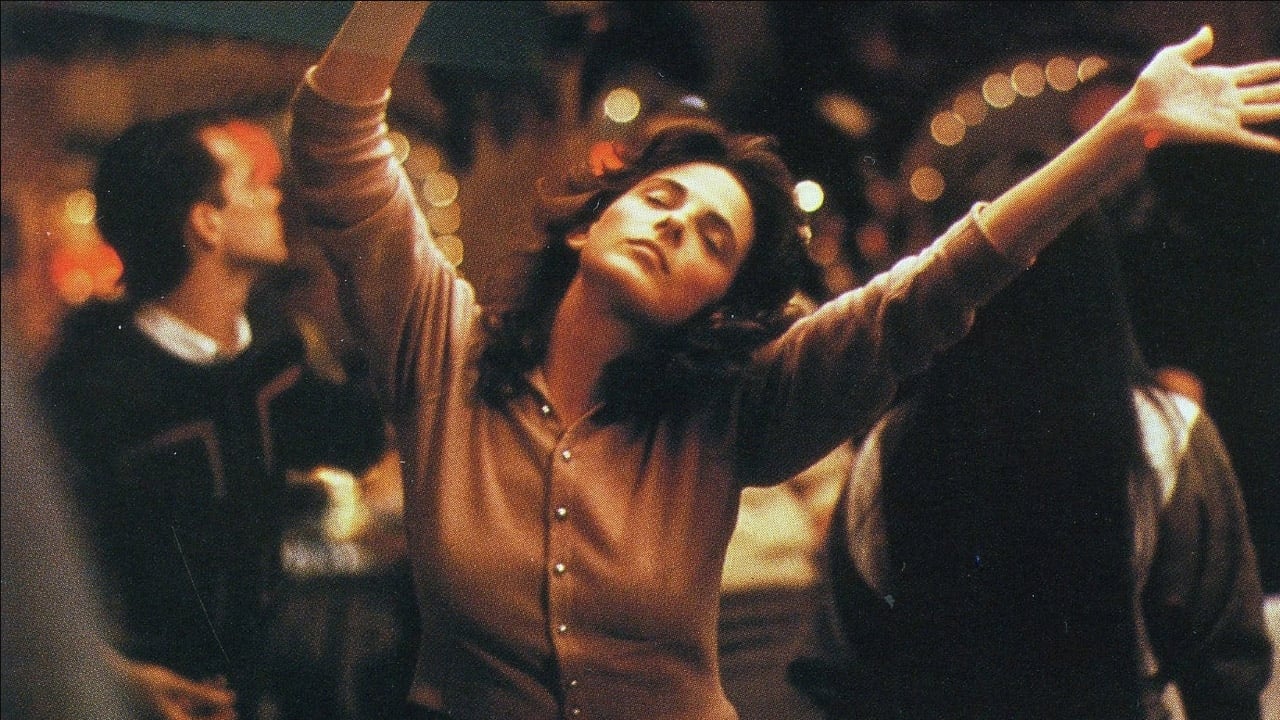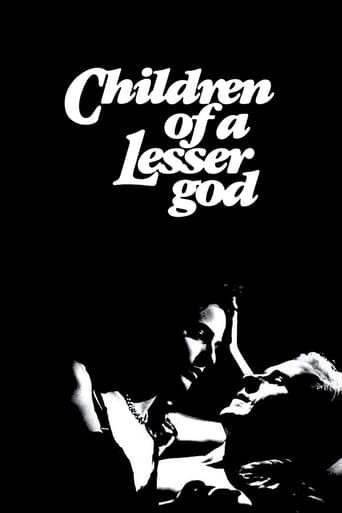Bardlerx
Strictly average movie
Reptileenbu
Did you people see the same film I saw?
Gary
The movie's not perfect, but it sticks the landing of its message. It was engaging - thrilling at times - and I personally thought it was a great time.
Phillipa
Strong acting helps the film overcome an uncertain premise and create characters that hold our attention absolutely.
Geoffrey DeLeons
This is a film that really needed to be made, giving the "hearing" population a glimpse into not only the physical world of deaf and hard-of-hearing persons, but their emotional world, as well. This is not to imply that all hearing-impaired persons react identically, nor even similarly, to their limitation, but, as we see in the film, the conditions of the person's life, both inner and outer, are significantly altered by the deprivation of this sense.An important aspect of deafness is addressed in Children of a Lesser God: That of the psychological/emotional impact of those who verbally and physically abuse and neglect hearing-impaired persons. We see Sarah (and some current students) locked int their own world, to varying extents, refusing to communicate or even try. Sarah explains her avoidance and hostility at one point, describing childhood scenes when she was mocked and derided by her "hearing" peers.Her courage (and the very fire that breeds her hostility) enables and impels her to communicate (in no uncertain terms). Other, current students of the school are not so brave nor lucky: Some refuse to communicate even by sign language, and we can easily assume that this avoidant behavior is the direct result of not the disability, but the resultant abuse (including condescention) and neglect from family, "friends" and other members of society. Marlee Martin does an incredible job of acting, communicating her thoughts and feelings with just a look. If only the director had given John Leeds the responsiveness to be able to interpret Sarah's messages in her eyes, body language, etc., then the film could have been even better.Instead, Leeds often stands dumbfounded, not particularly intuitive, nor deep, nor complex. It is this deeper level of engagement that is missing from Hurt's acting, and from the script, in-general.When Leeds asks Sarah, "Who are you?", after having known her for quite some time, it is his own failure and shallowness that is illuminated. Sarah makes every effort to reveal as much of herself as she can. I am not certain that William Hurt had the chops for this role. One scene I wish had been done differently: That scene when John and Sarah are at his home, and he lays down to listen to some classical music: His relentless tension, deeply-ingrained rigidity and seriousness prevent him from allowing him to enjoy both Sarah's company, and the music, at the same time.He is completely at a loss of how to communicate anything of the music to her. He should have shown her the sheet music, and somehow illustrated the music, pointing to the notes and rests, revealing the flow (tempo) of it to her as it plays. This man seems frozen in some sort of selfishness and convention (even though he's been to all of the best schools).I commend the acting of the students of the school. If these persons are, in-fact, hearing-impaired, then it took great courage to break past the fears and antipathies that separate the "hearing" persons from those who have a hearing impairment. The direction was done in a manner that the dignity of all was maintained. Even the principal was shown to not be a monster of rigidity, and I appreciate the director's stepping outside of the standard formula in this regard.Children of a Lesser God is an important movie. The movies I consider important, I can count on both hands. If you want to broaden your world, watch it.
brchthethird
CHILDREN OF A LESSER GOD seemed like it would feel right at home on the Lifetime Network. There's nothing wrong with that, per se, except that those types of films tend to go for the easy emotional hook rather than dealing with harsher realities that might be more true to life. However, this film rises above that, to a degree, thanks to some good work by the reliable William Hurt and an eye-opening performance by deaf actress Marlee Matlin. Her presence was critical to making it work, and its success mostly rests on her shoulders.The story concerns a teacher, James Leeds (William Hurt), who is a new addition to the faculty at Kittredge School for the Deaf. He is an idealistic person with unconventional teaching methods who quickly earns the trust and admiration of his students. However an employee, Sarah (Marlee Matlin), and also a former student, proves more of a challenge. Despite her resistance to him trying to help, a romance blossoms between the two and sets the stage for a clash of wills.Aside from the outstanding performances (including a small, but affecting turn by Piper Laurie as Sarah's mother), one thing I thought was really well-done was the intimate moments of conflict between James and Sarah after the point in the story where they fall in love. Those dialogue exchanges were key to what I felt was the central struggle in the film. Nominally, it was about a man in love trying to get through to a deaf woman, but it can also be generalized to any relationship where communication can be difficult. Men and women often enter a relationship hoping that the other person will meet them on their own terms, but the reality is that it's best if they meet each other halfway. This is something I thought was beautifully explored in the film. I also enjoyed the many scenes where James interacts with his students, as these provided some comic relief.Still, not everything was so admirable. For one, I thought that the film took a rather patriarchal attitude towards women. Marlee Matlin, strong as her performance may have been, is still playing a strong-willed woman who finds herself in being with a man, just shy of being domesticated. At one point during the obligatory separation part of any romantic drama, she moves back in with her mother and gets a job, but doesn't find fulfillment in it. I understand that this film was made close to 30 years ago (and the play it was based on) so it's a product of its time, but things like that have a detrimental effect on how well a film ages. And with respect to its attitudes towards women, this film has not aged well in my opinion. They also took a rather pedestrian and cliché approach to the typical romantic elements of the story.Overall, this was a well-acted and (seemingly) well-meaning look at love in a unique relationship/circumstance. Some of the music was a little too on-the-nose, but generally was fitting. I also enjoyed the 80's pop songs they included in the soundtrack. What the film does best is explore the difficulties inherent in a relationship between a hearing and deaf person, which can be generalized to the difficulty in any relationship. Still, it's retrograde (at least, now) attitude towards women makes it a little lesser of a film than it could have been.
tieman64
For its first hour, the cleverly titled "Children of a Lesser God" is a strong drama. It stars William Hurt as a maverick teacher at a school for the hearing impaired. He falls in love with a character played by Marlee Matlin, a young woman with a severe inferiority complex wrought by abuses faced as a deaf child. Hurt tries to teach Matlin sign language, but she's stubborn and refuses; she associates sign, and the world of speech itself, with all those who've wronged her.This is where the film becomes most interesting. Hurt and Matlin essentially engage in a sadomasochistic language game, both attempting to have their subjectivity, and language, affirmed as universal truth. "You want to talk to me, then you learn my language!" Hurt demands, but Matlin refuses. She will not let anyone define or force themselves upon her. "Talk to me!" Hurt insists, but Matlin remains mute. Eventually she learns that her language of silence is, or can be, equally a form of hate. The two then reconcile and find a common middle ground between sound and silence, though ultimately alienation, solitude and an inability to fully communicate are presented as being intrinsic to the love experience.Wonderfully acted, and filled with lovely autumnal shots of New England, "Children of a Lesser God" works well until its last hour. Here things get increasingly formulaic, and director Randa Haines rolls out a series of clichéd, heavy-handed domestic disputes.In addition to being the first female-directed film nominated for Best Picture, "Children" featured the first significant use of ASL (American Sign Language) in a mainstream Hollywood film, as well as a supporting cast of young actors and actresses who were actually deaf. Star Marlee Matlin became the youngest ever actress (and the first deaf person) to win a Best Actress Oscar.8/10 – Interesting material turns cloying. Worth one viewing.
Maddyclassicfilms
Directed by Randa Haines,Children Of A Lesser God is based on the stage play by Mark Medoff.Medoff along with Hesper Anderson wrote the screenplay resulting in one of the most beautiful films of the 1980's.It deals frankly with the complexities and frustrations associated with deafness and looks at how some deaf people are happy as they are and don't want to use their voices to speak.Sign language teacher James Leeds(William Hurt)travels to a fishing town in America,to take up a teaching position at their school for deaf youngsters.He encounters opposition with some students,because he encourages them to use their voices as well as just signing.He meets the school cleaner,Sarah Norman(Marlee Matlin who is hearing impaired herself)who used to be one of the schools brightest and most promising students.Trying to figure out why she didn't go on to better things,James realises he is falling in love with her.At first resistant and hostile towards him,Sarah soon shares his feelings.So begins an emotional journey,as they try to find a way to live together unhindered by both speech and deafness.Highlights include James teaching his students to speak and sing(they eventually put on a musical show),James and Sarah dancing in a restaurant and the famous swimming pool scene,which allows James to get a feel of what the world is like for Sarah on a daily basis.Marlee won(and completely deserved it)the best actress Oscar for her breathtaking performance as Sarah.At times Hurts translation of her ferocious signing is not needed,because we clearly understand her meaning as it's conveyed with so much emotion in her face.Hurt who I find to be a very subtle actor,is simply brilliant.His love and desperation conveyed perfectly without ever going over the top.There's also fine support from Philip Bosco as Sarah's former teacher and Piper Laurie as Sarah's mother.An uplifting and beautiful love story with a highly spirited main character who is unforgettable.Powerful performances and a haunting score by Michael Convertino all add to the power of the film.This is an experience that can't be easily explained,it's a film you have to see for yourself and become wrapped up in,you won't be disappointed.

